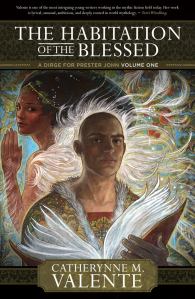On Speed Reading
Posted on: April 19, 2014
I’ve always been a little jealous of how fast my Mom can read. Books she zips through in two days will take me over a week to read. She finally admitted the other day that she’d taken a speed reading course in college, and I jokingly responded with “that’s cheating!”. Another friend in the conversation defended the speed reading course, because she’d taken the same one, and she said that this particular famous speed reading course taught one how to quickly get the most important information out of sentences and paragraphs. Presumably so you weren’t wasting your time on the unimportant stuff.
so, that assumes there is unimportant stuff?
And all I could think of was Catherynne M. Valente’s Prester John books, The Habitation of the Blessed, and The Folded World. Her prose in those novels reads like a stained glass window, where as the sun moves through the sky, the colors shift in the window, giving an illusion of continual movement and shadow as the story unfolds in the rainbow race of color across the floor and over your body. And on the other side of that stained glass window a symphony orchestra, complete with leitmotifs, counterpoints and returns, movements, and five or ten minutes of that gorgeous grey noise of pure potentiality when everyone is warming up before the conductor takes to the stage.
I realize I sound little melodramatic and over the top. And I do understand that when I say “that sounds like a sunset”, or “that sounds like purple”, that I am not actually seeing a sunset or that color (or seeing them consistently), but my brain is telling me those are the only words in my vocabulary that match what I’m experiencing at that moment. There is certainly an element of metaphor happening here, but there is also my complete confidence that those adjectives and phrases are the rightest ones.
For example, Shania Twain’s singing voice sounds like the color orange. I’m not seeing orange when I hear her voice, but in my brain, that is the adjective that best fits what I’m hearing. Singing voices tend to sound orange or like shades of blueish-purple, and men’s singing voices often taste like metal. I think there’s something to it that orange and blue are complimentary colors. Although Maluka’s voice sounds like sandstone, which isn’t part of the color wheel at all, so um, there’s that.
Which the long way around brings me back to: If I was speed reading, how much of would I miss? Would the stained glass window become simple clear leaded glass? Would there be no sun moving behind it, no movement of colors on the floor for me to chase after? Would the symphony be reduced to only the brass section, or just a string quartet, or one very bemused yet confusingly lonely oboe?
My Mom gets through way more books that I do. But I’ll keep my slower pace, thanks.
21 Responses to "On Speed Reading"
I agree, too. My wife doesn’t speed read, exactly, but she reads fast (a book that takes me 10 hours takes her around 3) and she admits that she doesn’t always read every word, that she sort of skims. I don’t want to feel that I’m missing anything. It’s also a sign of respect for the writer – they deserve my full read.
LikeLike
Speed reading techniques were developed specifically for business use. They are great for absorbing a lot of information where: you already know a lot of what is going to be in there, there is no varied vocabulary or surprises, and it’s kind of repetitive. So if you have a pile of reports to get through for your business, it’s great. It’s *not* designed for imaginative fiction or literature or anything much besides business.
However, we all have different reading speeds naturally. I am pretty fast, and I’ve never taken a speed reading course. Heavy non-fiction or really complex literature will slow me down. (I had to teach my daughter to slow down for non-fiction; she had developed a habit of gulping her books when she was younger, and if given a dense history chapter, would read it at top speed and then remember nothing. It was a surprise to her that different books require different reading techniques.)
You mom might just be a pretty fast reader by nature.
LikeLike
I never took the course. I am by no means a fast reader. I feel that I able to enjoy the book that I am reading. My wife on the other hand is a fast reader…she sucks lol.
I am Lynn though it takes me a bit longer if there are names and world(s) that are tougher to pronounce.
LikeLike
I agree with Anton, doesn’t seem to be something that makes a lot of sense for fiction. For me the words and how they are strung together is at least half of the fun. Loved that you described awesome writing as being like a stain glass window.
LikeLike
[…] for the poetry.” I’ve long taken his words to heart, and resisted learning to speed read. The Little Red Reviewer agrees with me and Professor Tweet, and explains why in charming […]
LikeLike




April 19, 2014 at 10:21 am
I agree with you. Speed reading fiction seems odd to me. Seems like a useful skill if you’re reading for information only, though (articles, textbooks, etc).
LikeLike
April 19, 2014 at 11:37 am
so, like, “skimming”?
LikeLike
April 19, 2014 at 11:46 am
Ha, I guess that’s what it is? I’m not sure. I think by skimming you just get the gist but lose some information.
LikeLike